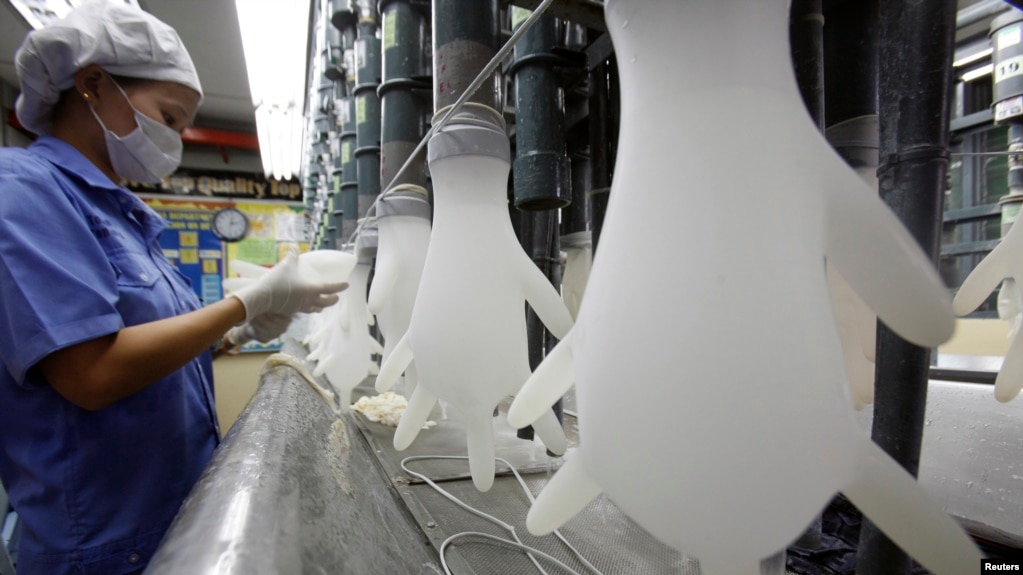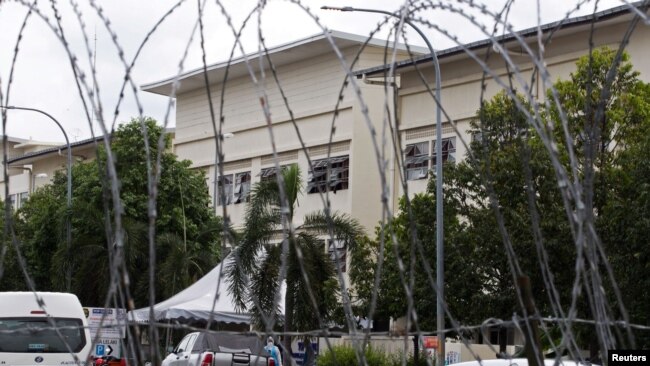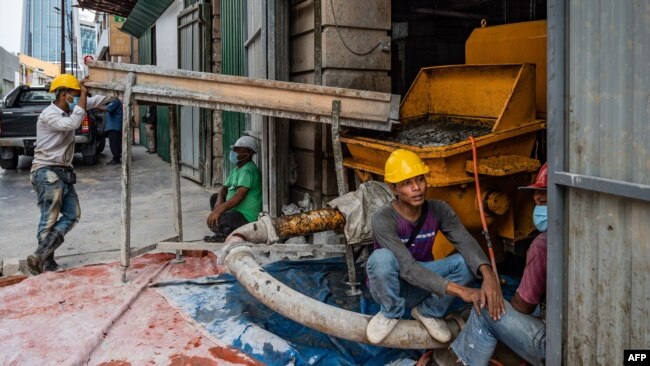February 09, 2022
Zsombor Peter

A worker inspects gloves at a Top Glove factory in Klang
outside Kuala Lumpur, Malaysia, Jan. 11, 2010.
BANGKOK — Malaysia’s government and business leaders say they are taking steps to stamp out forced labor amid a flurry of U.S. import bans over the rampant abuse of migrant workers making much of the world’s rubber gloves and palm oil.
Labor advocates and analysts, though, say their efforts still don’t go far enough.
Malaysia is the world’s leading supplier of medical rubber gloves and the second largest producer of palm oil, after Indonesia. Both industries draw overwhelmingly on workers from overseas to fill jobs most Malaysians shun because of the low pay, long hours and physical strain.
Over the past two-and-a-half years, U.S. Customs and Border Protection has slapped import bans on eight of Malaysia’s leading glove makers and palm oil producers — four of them since October — for alleged labor abuses ranging from excessive overtime and withheld wages to debt bondage and physical violence. Six of the so-called Withhold Release Orders are still active, more than for any other country except China.
The Malaysian companies have either promised to investigate the allegations or announced plans to upgrade their employees’ cramped and dingy dormitories, reimburse them for the crippling fees they had to pay job recruiters and other reforms.

BANGKOK — Malaysia’s government and business leaders say they are taking steps to stamp out forced labor amid a flurry of U.S. import bans over the rampant abuse of migrant workers making much of the world’s rubber gloves and palm oil.
Labor advocates and analysts, though, say their efforts still don’t go far enough.
Malaysia is the world’s leading supplier of medical rubber gloves and the second largest producer of palm oil, after Indonesia. Both industries draw overwhelmingly on workers from overseas to fill jobs most Malaysians shun because of the low pay, long hours and physical strain.
Over the past two-and-a-half years, U.S. Customs and Border Protection has slapped import bans on eight of Malaysia’s leading glove makers and palm oil producers — four of them since October — for alleged labor abuses ranging from excessive overtime and withheld wages to debt bondage and physical violence. Six of the so-called Withhold Release Orders are still active, more than for any other country except China.
The Malaysian companies have either promised to investigate the allegations or announced plans to upgrade their employees’ cramped and dingy dormitories, reimburse them for the crippling fees they had to pay job recruiters and other reforms.

FILE - Exterior of workers' hostel for Top Glove, the world's largest glove maker, is seen through barricade amid the COVID-19 outbreak in Meru, Selangor state, Malaysia, Nov. 24, 2020.
The government has taken heed as well. It proposed amendments to the Employment Act in October that would add fines and jail time for those guilty of forced labor abuses, and launched the country’s first National Action Plan on Forced Labor in November aimed at wiping out the practice by 2030. On Jan. 30, Human Resources Minister Saravanan Murugan said he would meet with all the companies facing WROs to discuss what they could learn from the companies that managed to get orders imposed on them lifted.
“I think they’re seeing their stance in the past, of some degree of denialism or dismissing these as just being some kind of foreign intervention that was trying to undermine Malaysia, is not tenable,” said Lee Hwok Aun, who runs the Malaysia Studies Program at Singapore’s Institute for Southeast Asian Studies and follows the country’s migrant labor issue.
But he and others say the government is still taking only half measures.
In an opinion piece for local news outlet Malaysiakini shortly after the government tabled its proposed amendments to the Employment Act in parliament, opposition lawmaker Charles Santiago slammed the bill for going too easy on forced labor. Penalties would max out at about $24,000 and two years in jail.
“To me it is still consistent with a government that cannot resist any more these kinds of legislative and policy changes … but [is] still being very reserved, being very partial in the way that it’s grappling with it,” said Lee.
During the launch of the National Action Plan on Forced Labor in November, the United Nations’ International Labor Organization, which helped develop it, called the plan “a major step towards eliminating forced labor” in the country.
The document lays out a number of ideas and goals for raising awareness of the problem, improving law enforcement and adding or enhancing related laws.
But none of it is binding, and labor activists say it addresses few, if any, of the main problems with Malaysia’s labor laws and policies, including work permits that tie migrants to a specific employer.
“The fact that workers cannot change employers, the fact that there’s systemic corruption, the fact that most of the workers in the country, like millions of workers, are employed by bogus employers who don’t have any legal status, all of these kind of issues that really contribute to forced labor in practice, as opposed to in theory I mean, they’re not even addressed in the action plan,” said independent labor rights advocate Andy Hall, who helped bring many of the alleged abuses against the Malaysian companies facing WROs to U.S. Customs and Border Protection’s attention.
“It’s a pretty document, but … we don’t see any signs of these changes being implemented on the ground,” he added.
The action plan suggests the government “consider” making work permits more flexible but makes no commitments.

The government has taken heed as well. It proposed amendments to the Employment Act in October that would add fines and jail time for those guilty of forced labor abuses, and launched the country’s first National Action Plan on Forced Labor in November aimed at wiping out the practice by 2030. On Jan. 30, Human Resources Minister Saravanan Murugan said he would meet with all the companies facing WROs to discuss what they could learn from the companies that managed to get orders imposed on them lifted.
“I think they’re seeing their stance in the past, of some degree of denialism or dismissing these as just being some kind of foreign intervention that was trying to undermine Malaysia, is not tenable,” said Lee Hwok Aun, who runs the Malaysia Studies Program at Singapore’s Institute for Southeast Asian Studies and follows the country’s migrant labor issue.
But he and others say the government is still taking only half measures.
In an opinion piece for local news outlet Malaysiakini shortly after the government tabled its proposed amendments to the Employment Act in parliament, opposition lawmaker Charles Santiago slammed the bill for going too easy on forced labor. Penalties would max out at about $24,000 and two years in jail.
“To me it is still consistent with a government that cannot resist any more these kinds of legislative and policy changes … but [is] still being very reserved, being very partial in the way that it’s grappling with it,” said Lee.
During the launch of the National Action Plan on Forced Labor in November, the United Nations’ International Labor Organization, which helped develop it, called the plan “a major step towards eliminating forced labor” in the country.
The document lays out a number of ideas and goals for raising awareness of the problem, improving law enforcement and adding or enhancing related laws.
But none of it is binding, and labor activists say it addresses few, if any, of the main problems with Malaysia’s labor laws and policies, including work permits that tie migrants to a specific employer.
“The fact that workers cannot change employers, the fact that there’s systemic corruption, the fact that most of the workers in the country, like millions of workers, are employed by bogus employers who don’t have any legal status, all of these kind of issues that really contribute to forced labor in practice, as opposed to in theory I mean, they’re not even addressed in the action plan,” said independent labor rights advocate Andy Hall, who helped bring many of the alleged abuses against the Malaysian companies facing WROs to U.S. Customs and Border Protection’s attention.
“It’s a pretty document, but … we don’t see any signs of these changes being implemented on the ground,” he added.
The action plan suggests the government “consider” making work permits more flexible but makes no commitments.

FILE - Workers rest at a construction site in Kuala Lumpur on July 3, 2020.
Real change, said Hall, will come only when the companies and the government start to hurt from the fallout financially.
“You have media, you have activists, you have unions and civil society. They can all make noise. But … at the end of the day it’s money, it’s brands, it’s investors, it’s buyers that really matter,” he said.
In November, Saravanan, the human resources minister, conceded to parliament that Malaysia’s forced labor woes were starting to hurt foreign investors’ confidence in the country as a reputable supply hub.
Harrison Cheng, Malaysia analyst for international consulting firm Control Risks, agreed. He said U.S. Customs and Border Protection’s sustained focus on Malaysia.
for the past two-and-a-half years was posing “considerable” risk to the country as a draw for foreign investors.
Cheng said some of the firms facing WROs counted on the United States for as much as one-fifth of their exports, and that Britain and Canada have put a hold on imports from some of the same companies while they investigate the forced labor allegations for themselves, adding to their pain.
Whether the pressure leads to meaningful reform, he said, will hinge on not only continued attention from the United States but sustained, and increased, enforcement by Malaysia.
But he warned that Malaysia’s recent run of wobbly governments made the long-range focus something like the national action plan would need to bear fruit look like “a distant prospect.”
The country has seen political defections bring down two governments in as many years. Cheng said another change in government could derail what momentum there is for labor reform.
“There is increasingly a push towards snap federal elections, and a change of administration could result in a change in priorities away from these labor reforms, or at the very least some delays in implementing them,” he said.
Real change, said Hall, will come only when the companies and the government start to hurt from the fallout financially.
“You have media, you have activists, you have unions and civil society. They can all make noise. But … at the end of the day it’s money, it’s brands, it’s investors, it’s buyers that really matter,” he said.
In November, Saravanan, the human resources minister, conceded to parliament that Malaysia’s forced labor woes were starting to hurt foreign investors’ confidence in the country as a reputable supply hub.
Harrison Cheng, Malaysia analyst for international consulting firm Control Risks, agreed. He said U.S. Customs and Border Protection’s sustained focus on Malaysia.
for the past two-and-a-half years was posing “considerable” risk to the country as a draw for foreign investors.
Cheng said some of the firms facing WROs counted on the United States for as much as one-fifth of their exports, and that Britain and Canada have put a hold on imports from some of the same companies while they investigate the forced labor allegations for themselves, adding to their pain.
Whether the pressure leads to meaningful reform, he said, will hinge on not only continued attention from the United States but sustained, and increased, enforcement by Malaysia.
But he warned that Malaysia’s recent run of wobbly governments made the long-range focus something like the national action plan would need to bear fruit look like “a distant prospect.”
The country has seen political defections bring down two governments in as many years. Cheng said another change in government could derail what momentum there is for labor reform.
“There is increasingly a push towards snap federal elections, and a change of administration could result in a change in priorities away from these labor reforms, or at the very least some delays in implementing them,” he said.
No comments:
Post a Comment